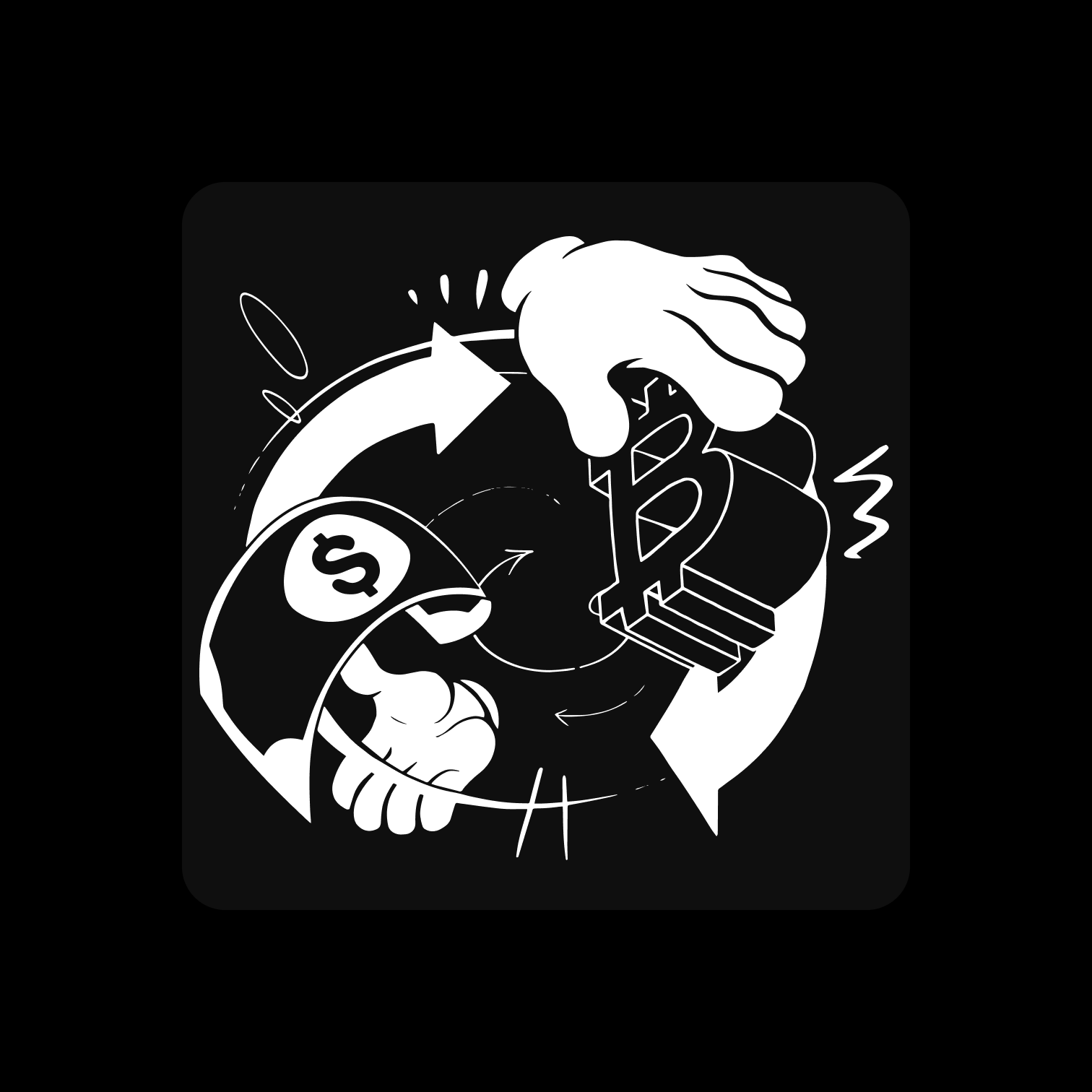What is a Bitcoin ETF?
Bitcoin Exchange Traded Funds – what they are and how they work
Bitcoin ETFs
First of all, what’s an ETF?
ETF stands for Exchange Traded Fund, which is a type of investment product that can be traded on stock exchanges. ETFs hold assets, such as stocks, bonds, or commodities, and then issue shares, which investors can buy to get investment exposure to those underlying assets.

The idea is that the shares of the ETF track the price of the underlying assets, which means that as the assets go up or down in price, the shares in the ETF go up or down in a similar way. For example, if you buy shares in a Gold ETF, your investment would go up or down alongside the price of gold. It's a way of getting investment exposure to gold, without having to buy physical gold coins yourself.
For the service of operating the ETF, the company that manages it (aka ETF Provider) charges a fee, typically a percentage of the total value of the fund’s assets.
So what’s a Bitcoin ETF?
A Bitcoin ETF is simply an ETF that holds bitcoin. It holds no other underlying asset – no other crypto, coin, or token… just bitcoin.
When the price of bitcoin goes up or down, the share price of the Bitcoin ETF goes up or down too. It’s a way to get investment exposure to bitcoin, without actually buying and owning the bitcoin directly.
Bitcoin ETFs differ from direct ownership of bitcoin, most notably in that ETFs incur ongoing management fees and don’t let you send, withdraw, and control your bitcoin yourself. The Strike app is a way to buy, sell, hold, send, and receive bitcoin, as well as withdraw it to your own custody, without incurring any management fees.

How does a Bitcoin ETF work?
From a high-level perspective, all you really need to know is that you can buy shares of a Bitcoin ETF in a brokerage account, and then as bitcoin’s price goes up or down, so too does your investment.
Under the hood, the operations of a Bitcoin ETF are a bit more technical and involve creating and redeeming shares. Before digging in, there are a few terms you might need to know:
- Net Asset Value (NAV): The value of the ETF’s holdings
- Authorized Participants (AP’s): Special designated partners (usually large financial institutions) that can participate in creating or redeeming shares of the ETF
- Custodian: The company that actually holds the bitcoin, which could be the ETF Provider itself or a 3rd party company
So how does a Bitcoin ETF work?
- Bitcoin ETF shares each represent a certain portion of the fund’s underlying bitcoin holdings (for example, 1 bitcoin per 1,000 shares), and are traded on a stock exchange.
- The share price rises and falls according to supply and demand.
- When there’s increased demand, the ETF share price rises, leading to a premium to NAV, meaning the ETF shares are higher in price than the underlying bitcoin they represent.
- This premium to NAV acts as a signal to the APs to create new ETF shares, which they do by delivering cash to the ETF Provider who buys bitcoin and deposits it to the fund’s custodian.
- The NAV of the Bitcoin ETF is updated to reflect the fund’s newly acquired bitcoin and the APs receive newly created ETF shares.
- The APs can then trade the shares in the open market, thereby collecting and closing any premium to NAV.
The reverse can also occur when there’s a discount to NAV, meaning the ETF shares are lower in price than the underlying bitcoin they represent. This leads APs to gather shares and return them to the ETF Provider, redeeming them in exchange for the cash value of the bitcoin they represent. The ETF Provider delivers the cash to the APs by selling the underlying bitcoin.
This whole system is designed so that the ETF tracks the market price of bitcoin. Whenever there’s a premium or discount to NAV, either due to trading of ETF shares or price fluctuations of the underlying bitcoin, the APs are able to bring the share price back in line with the value of the bitcoin they represent. This system also provides liquidity, as the APs are able to participate in trading of shares, even when regular investors may be reluctant or illiquid.
The above scenario describes cash-create type ETFs, where the APs create or redeem shares by exchanging cash with the ETF Provider, rather than bitcoin. Different Bitcoin ETFs around the world may operate with different creation/redemption processes, bitcoin-per-share ratios, management fee amounts or schedules, or settlement times for when the bitcoin or cash need to be exchanged. You can read about each ETF’s details on their website.
Overall, APs and ETF Providers work to keep deviations from NAV to a minimum, so that the share price tracks the price movements of bitcoin. A 5% move in bitcoin’s market price should result in a corresponding 5% price move in the Bitcoin ETF share price.

Should you buy into a Bitcoin ETF?
If you’re getting into bitcoin, the question arises: should you buy shares of a Bitcoin ETF or buy bitcoin directly?
Ultimately, it’s up to you.
For some, the convenience and familiarity of buying within their brokerage account is a big plus. For others, they might be swayed by “unit bias” – feeling better about owning whole shares of an ETF rather than owning fractions of a bitcoin, despite the fact that shares themselves represent a fraction of a bitcoin.
Before deciding what’s best for you, there are some factors to consider:
Management fees:
Bitcoin ETFs incur management fees, typically as a percentage of the total value of the fund’s holdings, while direct ownership has no ongoing management fees. From a long-term perspective, fees add up and are compounding, which steadily erodes the value of your holdings.
Control of funds:
Owning bitcoin directly gives you the freedom to move your assets where, when, and how you want, while ETF shares can only be held via a brokerage service and have limited or no ability to be transferred to an alternate brokerage or custodian.
Trading access:
Bitcoin ETFs can only be traded during market hours on business days, whereas owning bitcoin directly affords you the ability to buy and sell, any time, any day. During periods of high volatility, ETF-holders have to wait until markets open to be able to trade, while direct bitcoin-holders are free to trade and transfer when they please.
Counterparty risk:
Bitcoin ETFs require trust in certain 3rd parties: the ETF Provider and custodian must securely manage the bitcoin, the Authorized Participants must ensure liquidity and limit deviations from NAV, and your brokerage service must provide reliable trading and access to your holdings. With direct ownership, you can decide where your bitcoin is held and by who, including self-custodying where you are the holder and sole authority over your assets.
Future opportunities:
As the Bitcoin ecosystem grows, new use cases may arise for bitcoin holders, including using bitcoin to collect routing fees within the Lightning Network or posting bitcoin as collateral into escrow accounts to borrow against. Although these use cases are nascent and come with their own set of risks and complexities, they’re simply unavailable if your holdings are locked inside an ETF.
When considering whether to buy shares of an ETF, it’s important to consider the tradeoffs compared to buying bitcoin directly.
The Strike app offers a way to get into Bitcoin that’s simple and secure. You can sign up and buy bitcoin in minutes using regular cash payment methods, with little as $0.01 or as much as you want. Strike Private (private@strike.me) also provides OTC-desk bitcoin buying and selling for large orders from individuals, businesses, or institutions.
With Strike, you control how you trade, hold, transact, or withdraw your bitcoin – and never pay any ongoing “management fee”.
Please note: this content is for educational purposes only. Strike does not provide financial advice.
© 2025 NMLS ID 1902919 (Zap Solutions, Inc.)